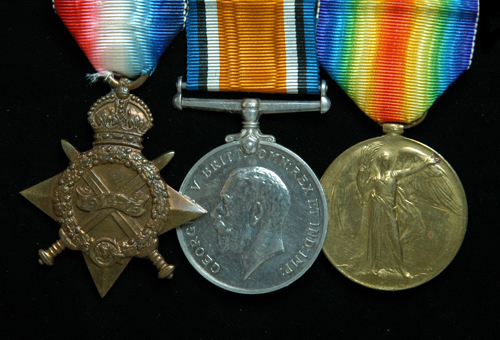
Auction: 7012 - Orders, Decorations, Medals & Militaria
Lot: 374
A Great War ´Canal du Nord 1918´ Casualty Group of Three to Corporal A. Lawless, Welsh Guards 1914-15 Star (61 L.Cpl. A. Lawless. W. Gds:); British War and Victory Medals (61 Cpl. A. Lawless. W. Gds.), extremely fine, with portrait photograph of recipient (3) Estimate £ 500-600 61 Corporal Albert Lawless, born Frodsham, Cheshire; enlisted Grenadier Guards, 2.9.1914; transferred Welsh Guards, 27.7.1915; Lance Corporal 4.10.1915; Corporal 3.5.1916; served during the Great War with the regiment in the French Theatre of War, 17.8.1915-27.9.1918; Lawless was killed in action on the latter date when the 1st Battalion were due to assault the Hindenburg Line, ´The task given to the Guards Division was to force the canal, breach the Hindenburg support system, and then secure a ridge of high ground which ran east and northeast of Flesquieres to Premy Chapel. During the night of the 26/27th the troops moved up to their positions in pouring rain, which caused some delay. But punctually at 5.20am, 2nd Guards Brigade launched their attack across the canal, and by 7am, they had established a bridgehead. By 11am, 1st Guards Brigade had passed through and gained a further 1,000 yards. Both brigades had suffered considerable casualties, first from the Hindenburg Support Line and then from Graincourt, outside their boundary to their left. Graincourt continued to give trouble until about 4.30pm when it was captured by the 57th Division, after a desperate resistance by the Germans. The 1st Battalion, Welsh Guards, crossed the canal at Lock 7, an obvious target for enemy shellfire, but they darted across by sections, miraculously without casualties. They then formed up in support of the 1st Grenadiers and closely followed their advance towards Flesquieres. This was at about 9am. The battle now became confused. Communications broke down between battalions and brigade, and between brigade and division. Grenadiers and Welshmen worked closely together, but in doing so became inextricably mixed. At about midday Captain L.F. Ellis, taking advantage of some abandoned trenches running towards Flesquieres, led No 3 Company to the outskirts of the village, where he was eventually joined by the Prince of Wales and No 2 Companies. The whole Battalion then secured a line, north of the village, in a sunken road. The Grenadier and Welsh Guards had now driven a tenuous wedge into the German lines: from Graincourt on the left, German gunners were firing at them over open sights, while any movement beyond Flesquieres drew violent machine gun fire from the right. It was in the sunken road that Lieutenant-Colonel Luxmoore-Ball met Lord Gort, commanding the Grenadiers. Gort had been held up by a strongpoint in a beet factory, just north of Flesquieres. This he had successfully outflanked. Now he asked for Luxmoore-Ball´s assistance in fighting his way further along the ridge, towards Premy Chapel. This was readily agreed by Luxmoore-Ball, who ordered Nos. 2 and 3 Companies to advance either side of the ridge and guard the Grenadiers´s flanks. The battle along the ridge was a fierce one. The leading companies got within 50 yards of the Premy defences, but were held by intense machine gun fire. Gort was severely wounded (for this action he was awarded the Victoria Cross), and Luxmoore-Ball, now senior officer on the spot decided that no further attempts could be made for the moment. He had no artillery support, the Germans could be seen reinforcing Premy, and with both flanks open, the position of the two battalions was too deep and narrow for comfort. He therefore ordered the battalions to stand fast, a decision which was confirmed by Brigade Headquarters. At 4.30pm, the pressure was relieved. On the left Graincourt fell to 57th Division, and 12th Division came up in line on the right. By 7.30pm the whole position was firm enough for the two battalions to be relieved. The 1st Battalion, Welsh Guards, lost 87 killed and wounded that day, a day of which the Guards Division could be proud. To have stormed the Canal du Nord and cut through the Hindenburg defence system was a considerable feat of arms.´ (The Welsh Guards, J. Retallack, refers). Lawless is buried in the Louveral Military Cemetery, Doignies, France.
Sold for
£580




